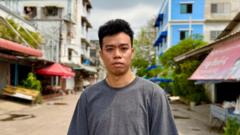Ko Naing last saw his great-uncle on the banks of the Irrawaddy River in July, before he made the difficult choice to flee Myanmar. Now residing in Thailand, Ko Naing, a labor rights activist and supporter of Myanmar's resistance against the military junta, is devastated after learning that his uncle was killed in a recent earthquake that struck Sagaing near Mandalay. As he grapples with survivor’s guilt and helplessness, Ko Naing feels the weight of responsibility for his people back home, now suffering from the consequences of both natural disaster and political turmoil.
The recent earthquake, registering as the strongest the region has seen in a century, has claimed over 2,000 lives and devastated families across the country, including many of Ko Naing's own relatives. Being part of the large Myanmar diaspora community in Thailand, which numbers around 4.3 million — not counting undocumented migrants — he constantly checks updates on his family. For citizens like Ko Naing, each report of the destruction adds to their anguish, particularly as political realities complicate any potential return home to assist in recovery efforts.
The rescue and recovery efforts from afar are further complicated by the fear of political persecution that many like Ko Naing experience if they were to return to Myanmar. As the dust settles from the earthquake, those who have escaped the violence of Myanmar’s military junta are left feeling like bystanders, unable to participate in critical support measures for their loved ones in distress. Many are struggling with feelings of guilt about enjoying safety while their compatriots suffer.
In Samut Sakhon, a hub for Myanmar workers, locals are grieving significant losses, both in lives and in cultural heritage, such as historical pagodas and temples destroyed in the quake. Heart-rending stories emerge, like that of shop owner Thant Zin, who laments the loss of structures that have stood for centuries. Meanwhile, laborers in industries like construction fear for their fellow countrymen affected by the earthquake and a separate building collapse in Bangkok — both events driven by their desperate economic situation amid political unrest and environmental disasters.
As many members of the Myanmar diaspora read reports of destruction online, they remember their loved ones who are directly impacted. For Ko Naing, who once believed his escape would lead to safety, the memories of shared moments with his uncle, such as those lazy summer afternoons by the river, haunt him as he tries to process his grief and make sense of his now fragmented family.
In the aftermath of the quake, while Ko Naing remains deeply saddened, he is also taking action. Alongside other members of the Myanmar diaspora, he is working to collect donations and provide humanitarian support to those affected back home. Although they face many adversities, Ko Naing believes in the potential for resilience within their community. His philosophy emphasizes the need to harness what little power they still possess to support their homeland, affirming that it's essential to channel their anguish into productive assistance.
While the memories of loss linger heavily, Ko Naing expresses a commitment to move forward — looking for ways to rebuild and inspire those still in Myanmar to persevere despite overwhelming challenges.

















